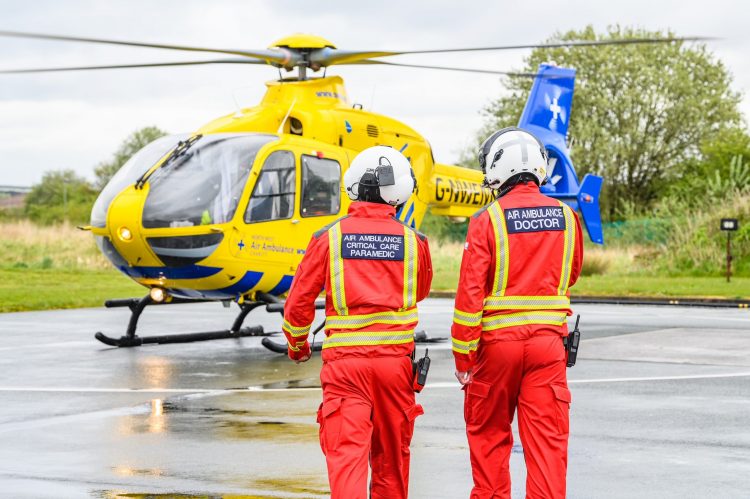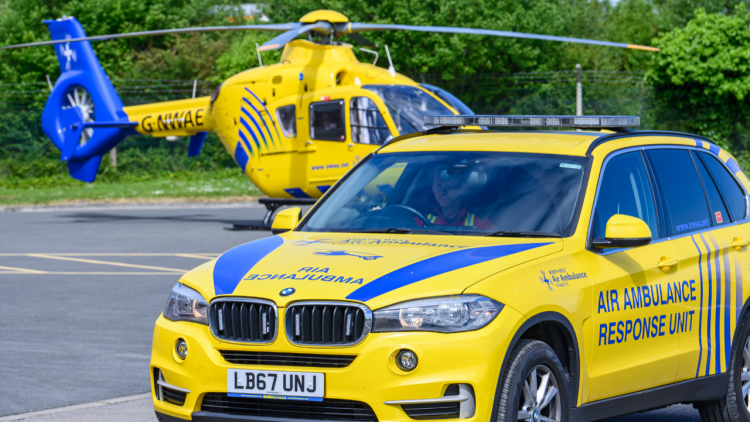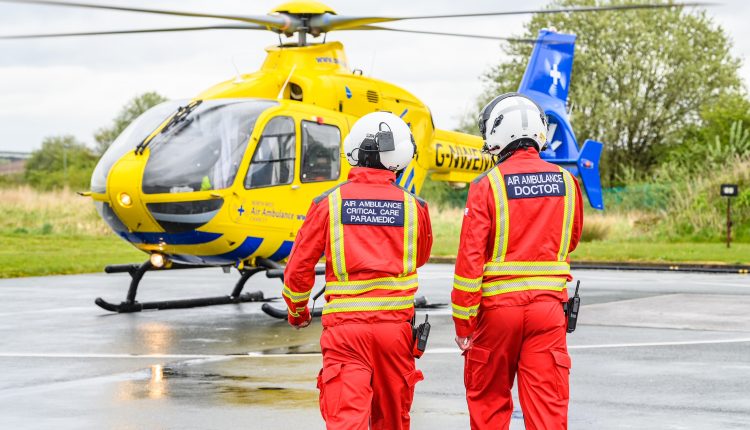Critical service that has to raise £9.5m every year
Air ambulances now play an integral role in emergency healthcare but the North West Air Ambulance gets no NHS funding and has to raise more than £9m every year just to stay in the air. Tony McDonough reports

Getting an air ambulance to the scene of an accident quickly can be the difference between life and death.
It is therefore a surprise to many people that the North West Air Ambulance Charity is not funded by the NHS or the Government. Every year the North West Air Ambulance Charity (NWAA) must raise £9.5m just to keep its lifesaving service in operation.
Covering five counties, including Merseyside, Cheshire, Greater Manchester, Lancashire and Cumbria, the North West Air Ambulance Charity operates three helicopters and four Critical Care Paramedic vehicles on the ground.
Founded in 1999, the service initially operated five days a week. In 2002 it expanded to become a seven-day-a-week operation. Its three helicopters and four HEMS response vehicles operate 365 days a year, with specialist doctors and Helicopter Emergency Medical Service (HEMS) paramedics on board.
The charity covers an area of over 5,500 square miles and over 8 million people. Since its launch in 1999, NWAA has responded to 24,500 call-outs. It is now called out, on average, three times a day.
In the last few years there has been a significant shift in the way NWAA deals with critically ill patients. Emma Pearson, regional fundraising manager at the charity, explains: “Our work used to be about getting the patient to a hospital as quickly as possible.
“However, thanks to enhanced expertise and new technological innovations our medical teams will often treat people on the scene. They can even perform procedures right there at the roadside.
“Once they are stabilised the crew will then decide which is the best hospital to take the patient to. Whilst this may not always be the closest, getting the patient to the hospital that meets their needs most closely is vital to providing them with definitive care.”
In 2019, NWAA capability was enhanced further when it launched its ‘Blood on Board’ policy. This means crews are able to administer blood transfusions at the scene. This significantly improves the survival odds for the most seriously ill casualties.
If it wasn’t for this change, plumber Rob Gardner might not be alive today. On June 4 this year, Rob was working in his garden ahead of a family gathering. Cutting wood using a new chainsaw, the machinery bounced back off the wood hitting Rob in the chest, causing catastrophic injuries.
He said: “I was preparing the garden as we were getting ready for a party. I was cutting up some logs that needed clearing and the chainsaw bounced back up. It hit me in the chest and I had to fight to get it off me.”
His wife Karen attempted to stop the bleeding using a dustsheet from the shed, pressing onto Rob’s wound while speaking to 999 call handlers. The North West Air Ambulance crew was dispatched to the scene. They transfused eight units of pre-hospital blood there and then.
Eimhear Quinn and Adam Wager, consultant HEMS Doctor and HEMS critical care paramedic for the charity, were the team on the helicopter that day. They used blood products to maintain blood flow and pressure to his heart, allowing Rob to travel to hospital for immediate surgery.
READ MORE: Liverpool charity fills gap as social fabric unravels
READ MORE: Negative COVID test mandatory for World Cup fans
“We immediately started to transfuse Rob with our blood products as quickly as we could and we needed to move him towards an operating theatre as soon as possible,” said Eimhear.
“Undoubtedly without the pre-hospital blood transfusions, Rob would have died on the way to hospital. The injuries he sustained included laceration of his subclavian artery and vein. These are large vessels inside the chest that originate very close to the heart and pump blood at high volume and pressure.”
Rob was then transported to hospital where he underwent further emergency treatment. Now back home with his family, he said: ““I think doctors give you time…they’ve given me time. Time to watch my kids grow up, time to be with my wife. They’re giving me time to grow a bit older and appreciate life a little bit more and enjoy it.


“The intervention and treatment from the North West Air Ambulance Charity was the pinnacle point for me. They gave me the time to get to the hospital. I’ve been very lucky – I feel like a very lucky man.”
The North West Air Ambulance Charity operates from its headquarters in Knowsley. Its crews are located at two sites – Blackpool and Barton near Manchester. They are ready to respond to emergencies seven-days-a-week, 365 days a year.
Emma added: “ A specifically trained HEMS Emergency Medical Dispatcher monitors the 999 calls as they come in, along with one of our HEMS paramedics. They will determine which calls meet the specific criteria and our crew will bring the most benefit to.
“We tend to see the crews called out to the most critical incidents, including road traffic collisions, falls from height, incidents in remote locations and medical emergencies such as cardiac arrests. The decision to call us out may be made in the dispatch centre or it may come from the paramedic at the scene.”
An average call-out costs around £3,500, with more specialised interventions often costing much more, hence the need for NWAA to keep fundraising constantly. Emma said: “Air ambulances have been around a long time now. People see them as an integral part of the health service. So people are still amazed when they find out we are not funded by the NHS.
“There is an upside to that. Because we are not Government-funded we can escape some of the bureaucracy that can go along with that. It means we are free to work with other outside organisations. We have strong links with the universities and that gives us access to expertise that leads to better innovation in patient care.
“However, the push to raise money never ends. We need £9.5m a year to keep the service going. That is always a challenge at the best of times. It was particularly so during the COVID-19 pandemic which affected us both operationally and financially.
“COVID put a huge strain on the whole healthcare system and we played our part in taking some of the pressure off hospitals. But, similar to many charities, it did impact on our ability to raise money and we saw income drop by around £1.18m.
“We rely solely on the support of businesses and individuals across the North West to maintain our lifesaving service.
“I think when people realise we are a charity they are keen to help as much as they can. Our crews are out there day and night saving lives and it is essential we work as hard as we can to support them to keep doing that.”
To find out more about how you can support the North West Air Ambulance Charity, click here.

